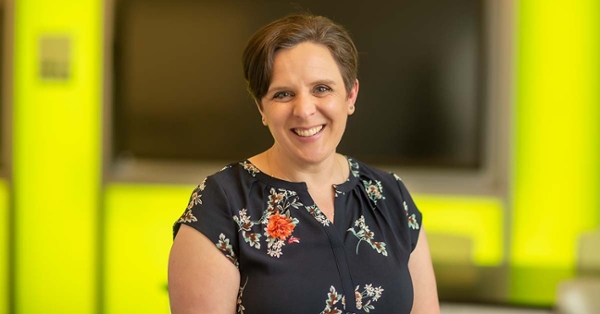Rowan University professor earns recognition for excellence in engineering education
Rowan University professor earns recognition for excellence in engineering education

Dr. Kaitlin Mallouk, assistant professor in the Experiential Engineering Education Department (ExEEd) in the Henry M. Rowan College of Engineering, has received the 2022 Distinguished Teaching Award for the Middle Atlantic Section of the American Society for Engineering Education (ASEE).
The award honors an individual in each section, distinguished by region, dedicated to excellence in engineering education. As an organization, ASEE is committed to supporting faculty scholarship and innovative methods that develop pedagogical knowledge.
An active member of ASEE since 2013, Mallouk also gained the honor of Best Division Paper for the Division of Experimental and Laboratory Studies at the ASEE Annual Conference in 2015. The year prior, she received the Mara Wasburn Early Engineering Education Grant for the Division of Women in Engineering.
“Dr. Mallouk is an outstanding educator who has made an impact on engineering education at Rowan through her contributions to innovative curriculum and learner-centered pedagogy,” said Dr. Stephanie Farrell, professor and founding department head of Rowan's Experiential Engineering Education Department (ExEEd). “In the classroom, she stimulates intellectual excitement for engineering topics through innovative, hands-on projects, while cultivating a culture where students’ individual experiences, identities and contributions are valued.”
Engineering education became the driving force of Mallouk’s career goals during the latter half of her higher education.
“I was a graduate student at the University of Illinois and about halfway through my program, I figured out that the reason I was getting a Ph.D was so I could teach at the college level,” Mallouk said.
Fortunately, she found her home at Rowan University.
“The College of Engineering was formed very intentionally to be based in the best practices for engineering education,” said Mallouk. “Rowan really values excellence in teaching and innovating in the classroom in a way that is unique.”
Often, her position allows her to use engineering in ways she never thought possible.
“I was explaining to my dad how I’m trying new things in the classroom and trying to be innovative,” said Mallouk. “He said, ‘Oh, so instead of engineering physical things, you engineer educational experiences’ and I said ‘Oh! Yeah, I am!’ That was eye-opening for me because, in my mind, I had left engineering behind to teach, but really, I was applying engineering to teaching.”
Some of the ways she uses innovation in her classroom are through “curiosity cabinets,” as well as a newer exercise called an “asset map.” Curiosity cabinets allow the students to share something interesting, meaningful, or personal to them that reveals something about their identity.
“I try to assess how my students are doing as whole humans,” said Mallouk. “I like to be able to acknowledge their humanity.”
“Knowing that a professor is on my side and doing her best to tackle challenges with me gives me a sense of confidence and serves as a reminder that no one is alone,” said Caroline Thistle, who earned her mechanical engineering degree in 2021.
Asset maps also allow space for the students to learn something new and create deeper connections with themselves and with each other. Mallouk asks the students to identify their assets in a variety of different areas: technical knowledge such as calculus and chemistry, and more cultural or personal abilities such as knitting. The goal is to highlight the value of skills outside of engineering.
“It’s not about whether you know the math or science, although those are really important,” said Mallouk. “Really, becoming an engineer teaches you how to problem-solve and think in a way that’s different from most people.”
Mallouk received her Bachelor of Science in chemical engineering from Cornell University and both her Master of Science and Ph.D in environmental engineering in civil engineering from the University of Illinois. Her research at Rowan focuses on engineering education, faculty development and reflection in engineering education.